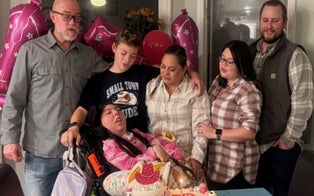A father was granted temporary custody of his 4-year-old daughter because her mom is an ER doctor on the front lines of COVID-19.
A Florida emergency room doctor and mother working on the front lines battling COVID-19 has temporarily lost custody of her 4-year-old daughter after her ex-husband went to court over fears about her and her daughter's safety.
"I'm fighting this with everything I have," Dr. Theresa Greene told Inside Edition. "For myself and other frontline workers."
Her ex-husband went to court and was awarded custody of the girl until the pandemic is over. His attorney, Steve Nullman, sent a statement to Inside Edition:
"Pursuant to Mr. Greene’s request and as ordered by the Court, Dr. Greene is to be provided future make-up timesharing for each day missed during this challenging time and daily video communication with the child. We will continue to pursue ways to resolve this delicate situation and believe that a result can be achieved safely and fairly."
Thousands of health care workers across the U.S. have been hit with the virus. According to the American Medical Association, frontline physicians should be able to go home to their families and to their children, as long as they take proper precautions.
Greene says she's appealing the emergency order granted to her ex-husband. In the meantime, she will only be able to see her daughter online.
Nullman's statement, continued: "Mr. Greene and I have the upmost respect for Dr. Greene’s commitment to her critical work during this pandemic. We recognize and genuinely appreciate the sacrifices that she and all healthcare workers are all currently making to save lives and prevent further illness in Florida and around the world. The Greenes' temporary timesharing dispute was presented before the Court based upon the specific facts of this individual family and a decision was reached based upon the best interests and safety of a minor child, limited to the temporary circumstances presented by COVID-19. The Court’s ruling was not intended to serve as a blanket rule, nor should it.
RELATED STORIES





